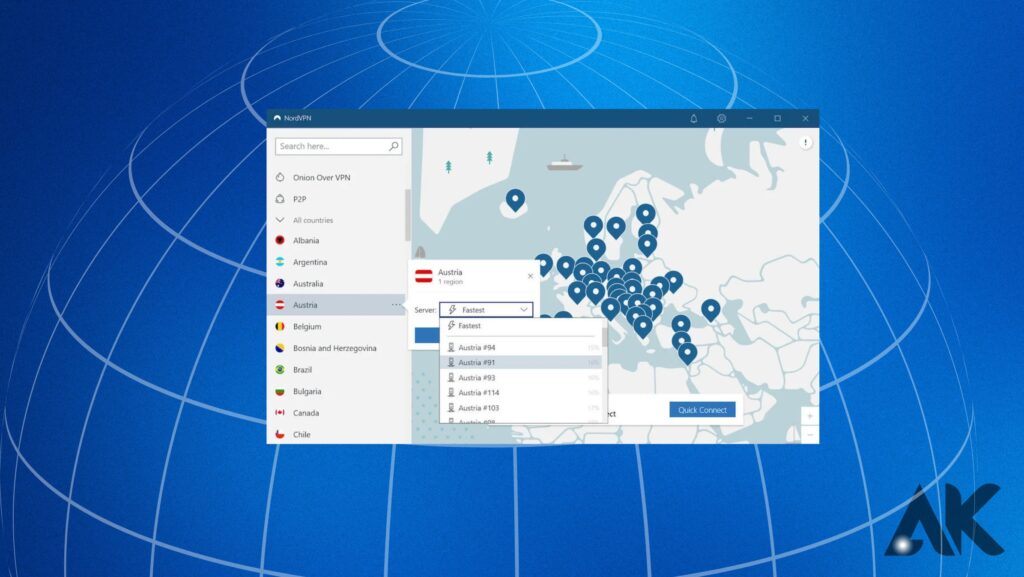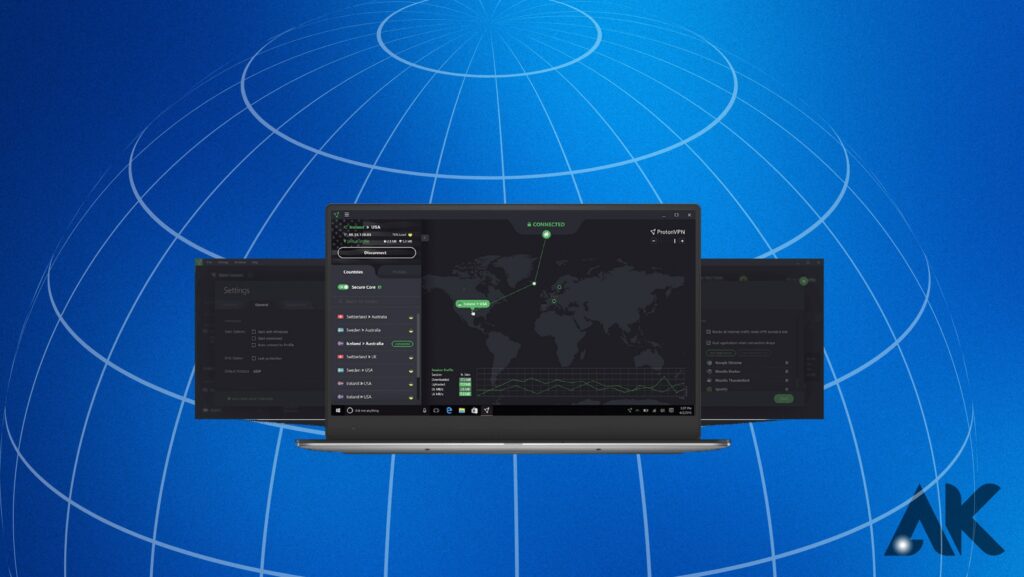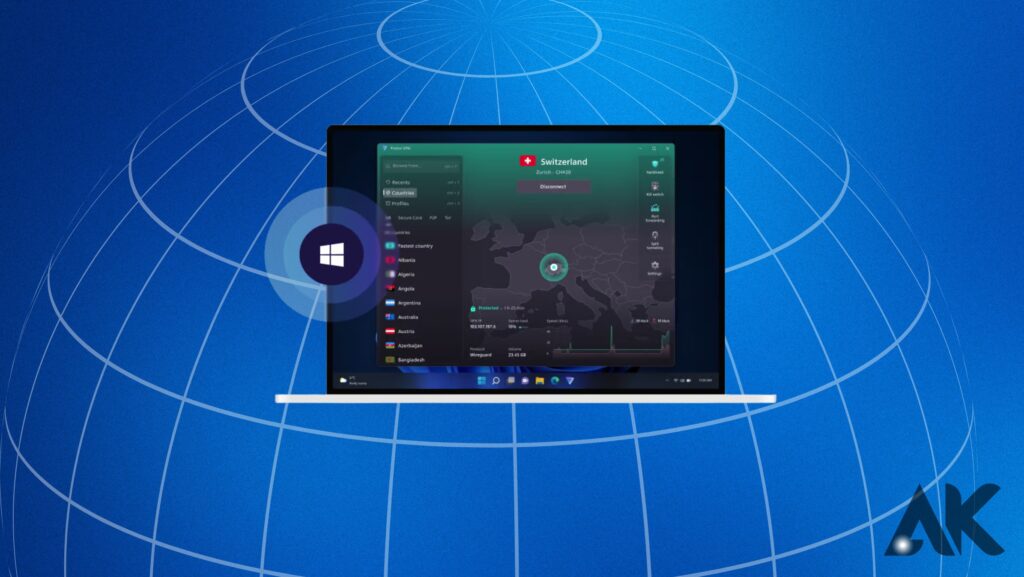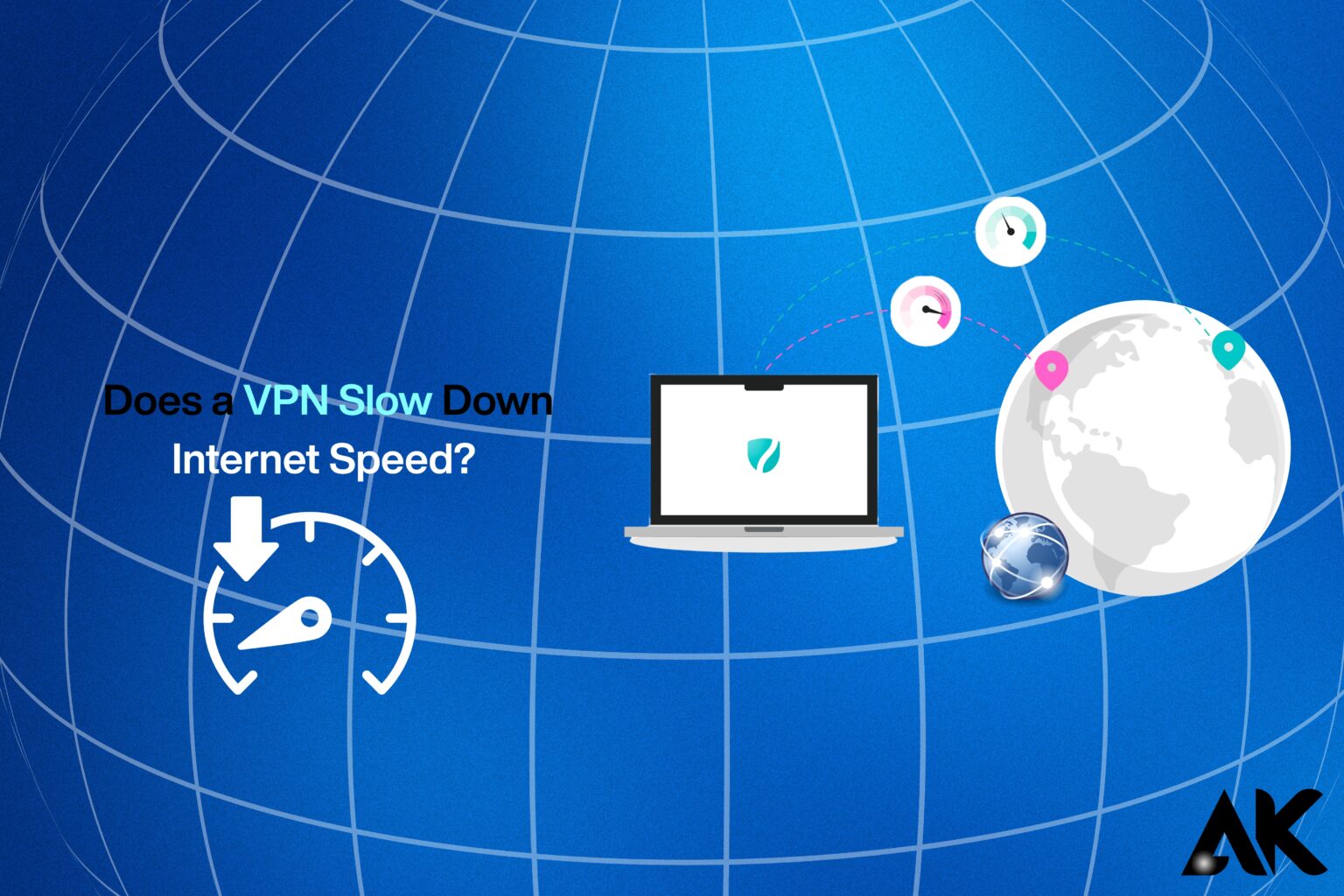Does a VPN slow down internet speed? Have you ever noticed a slowdown in your internet speed after implementing a VPN? [Does a VPN slow down internet speed?] is a frequently asked question. People expect seamless, quick surfing, gaming, and streaming in addition to the security and privacy that a VPN provides. As the importance of online privacy grows, more people are setting up virtual private networks (VPNs) to unblock websites, browse more safely, and access content from other nations. When customers see that movies buffer more frequently, websites take longer to load, or downloads take longer, they start to question whether their VPN is the cause. Thus, it is understandable why the query [Does a VPN slow down internet speed?] frequently appears in online forums and search results.
Examining how VPNs operate, the reasons for slowdowns, and whether or not you can prevent or resolve them will help you better comprehend this problem. You most likely want both privacy and performance if you’re new to VPNs or are thinking about getting one. To help you determine whether a VPN is good for you and whether it actually affects your connection, this post will break down everything into easily understandable terms. Above all, you’ll learn the answer to the most crucial question: [Does a VPN slow down internet speed?] and several solutions.
How VPNs Work and Why They Might Affect Speed

We must comprehend how VPNs function to answer the question, “Does a VPN slow down internet speed?” Between your device and the internet, a virtual private network, or VPN, builds a secure tunnel. Your traffic is initially routed via a distant VPN server rather than straight to a website. Your information is protected from hackers, your internet provider, and anybody else attempting to monitor your online activities thanks to this server’s encryption and hiding of your true IP address. That’s excellent for privacy, particularly when using public Wi-Fi or sensitive accounts.
However, taking the extra step of rerouting and encrypting your traffic can cause lag. The longer it takes for your data to travel, the further away the VPN server is from you. Additionally, greater encryption requires more effort from the server and your device, which may cause a tiny decrease in speed. The question, “Does a VPN slow down internet speed?” is thus legitimately asked. Based on how VPNs work, it’s not just a theory; it’s an actual possibility. There are numerous strategies to control and lessen that influence, though, as we’ll explore in the next sections.
Does a VPN Slow Down Internet Speed? The Real Impact Explained

Let’s go down to the real question: [Does a VPN slow down internet speed?] It can, but it doesn’t always. You are adding more steps between your device and the website or service you wish to access when you use a VPN. These procedures include filtering traffic in some situations, server rerouting, and encryption. A decrease in speed may result from any of these factors. The degree of slowing depends on your internet speed and the quality of your VPN. Your speed may be lowered with a good VPN by about 5% to 10%, which is hardly perceptible for the majority of daily activities like emailing, streaming HD videos, and browsing.
On the other hand, poor-quality or free VPNs may result in significant lag, particularly if their servers are overloaded or distant. Some users complain about lengthy download times, dropped video calls, and streaming delays. Some claim that when their ISP was blocking specific websites, their VPN actually increased speed. Therefore, the actual response to the question, “Does a VPN slow down internet speed?” is that it depends on a variety of factors. It does and doesn’t at different times. Additionally, there are frequently easy ways to completely prevent slowdowns.
Top Factors That Influence VPN Speed

We have to consider the various aspects that can impact performance while trying to answer the question, “Does a VPN slow down internet speed? First, a significant factor is the distance between you and the VPN server. When the server is farther away, data travels more slowly, increasing latency. Second, the VPN’s encryption strength also affects speed. Although strong encryption requires more time and computing power, it is safer. Third, the VPN provider’s caliber is important. While free or inexpensive VPNs may rely on outdated, sluggish, or overloaded systems that can slow down your connection, top-rated VPNs invest in fast, modern infrastructure with numerous servers.
Your base internet speed is a further significant factor. Adding a VPN could make your already sluggish internet connection even worse. However, if your connection is fast, you might not notice even a slight decrease in performance from the VPN. Because of the interplay of these variables, people frequently have varying experiences. “Yes, absolutely, [does a VPN slow down internet speed?]—mine was terrible!” One person may respond, while another may claim they never noticed a difference.
How to Choose a VPN That Doesn’t Significantly Slow You Down
Selecting the correct VPN company is crucial if you’re wondering, Does a VPN slow down internet speed?” and want to stay clear of issues. Some VPNs prioritize speed, while others prioritize secrecy. Seek VPNs with many servers, particularly those close to where you are. A provider’s ability to manage traffic without experiencing overload improves with the number of servers they have. Additionally, see if the VPN supports updated protocols like Lightway or WireGuard, which are quicker and more effective than more antiquated ones like PPTP or OpenVPN.
Whether the VPN has a reputation for not limiting your speeds and offers limitless bandwidth is another crucial consideration. Examine evaluations and seek service providers who highlight performance in their advertising. Some VPNs even have dedicated servers for streaming and gaming if those are your primary concerns. The top VPNs help you stay safe online without compromising speed by finding a compromise between security and speed. Therefore, the answer to the question, Does a VPN slow down internet speed? greatly relies on the VPN you use.
Does a VPN Slow Down Internet speeds on All Devices?
Device types are another aspect of the subject. Does using a VPN slow down internet speed? Depending on whether you’re using a phone, laptop, smart TV, or game console, VPN performance can differ significantly. Because smartphones and tablets have smaller batteries and less computing power, VPNs may cause a modest slowdown in speed. Good mobile apps that are performance-optimized, however, can lessen that impact. If you have a powerful processor and a steady internet connection, the difference between a desktop and a laptop is frequently less obvious.
The situation is different for gaming consoles and smart TVs. Occasionally, these devices lack native VPN support, necessitating the usage of routers with VPN functionality or intelligent DNS services. If not set up properly, this configuration may cause problems with performance and stability. Online gaming and 4K streaming are examples of high-bandwidth activity that can be more vulnerable to even minor lags. Therefore, it’s crucial to take into account the type of device being used and how it manages VPN traffic when consumers inquire, “Does a VPN slow down internet speed?
Can a VPN Ever Improve Internet Speed?
The answer to the question, Does a VPN slow down internet speed? isn’t necessarily “yes,” which may surprise you. In certain cases, a VPN can even speed up your internet. This scenario typically occurs when your internet service provider (ISP) purposefully slows down or “throttles” specific websites, like gaming servers, streaming platforms, or torrenting services. ISPs take this action to control bandwidth usage or encourage users to upgrade to more expensive plans. However, your ISP can no longer see the websites or services you’re using when you connect via a VPN. It can no longer limit particular websites because it can only view encrypted traffic flowing to a VPN server.
In certain scenarios, utilizing a VPN to circumvent these limitations can result in faster loading times, enhanced video quality, or smoother gameplay. However, this improvement in performance is typically limited to situations where ISP throttling is the primary cause. If poor Wi-Fi, outdated devices, or insufficient routing lead to slow speeds, a VPN won’t instantly rectify these issues. However, this illustrates why the answer to the question, “Does a VPN slow down internet speed?” isn’t always definitive.
Testing Your Internet Speed With and Without a VPN
Doing a speed test is one of the best ways to determine, does a VPN slow down internet speed? for your particular situation. Tools like Speedtest.net and Fast.com make this simple. Start by recording your download, upload, and ping speeds while testing your internet speed without the VPN enabled. Thereafter, activate the VPN, establish a connection to a server of your choosing, and repeat the test. To determine whether the VPN is having any effect, compare the two outcomes. For regular surfing, you may discover that the speed decrease is negligible or even invisible.
The topic does a VPN slow down internet speed? can be answered more clearly and specifically with this type of testing. It also assists you in determining which protocols or servers provide the best performance. To make this procedure easier, some VPN apps even come with built-in speed test tools. Testing can assist you in optimizing your VPN configuration to get the security and performance that the majority of users truly desire.
What Internet Activities Are Most Affected by VPN Speed?
The question does a VPN slow down internet speed? is more complex because a slower VPN connection affects different online tasks. You most likely won’t notice a significant difference in speed for social networking, emails, and ordinary online browsing. These activities don’t demand a lot of bandwidth, and modern VPNs can manage them with ease. However, even minor speed decreases can have an impact on data-intensive tasks like online gaming, file downloads, cloud backups, and video streaming. For instance, Netflix video quality may suffer, or lengthy wait times may occur when downloading giant files due to a slower VPN connection.
Particularly in fast-paced online multiplayer games, gaming might be especially vulnerable to latency or lag caused by a VPN. If the VPN causes your ping to increase by 100 ms, you may experience latency while playing. On the other hand, a VPN can occasionally increase stability while connecting to a game server located in a different nation. The answer to the question, Does a VPN slow down internet speed? can vary greatly depending on your online activity and the specific use case.
Conclusion
What is the end result of Does a VPN slow down internet speed? after reading all the information? Yes, it can, but it doesn’t always, and with a decent VPN provider, the slowdown is typically minimal. For typical online tasks, many users don’t notice any difference in speed, particularly if they have a fast base internet connection, select the appropriate server, and utilize contemporary VPN protocols. Sometimes a VPN can help speed things up, such as when avoiding ISP throttling.
The main lesson is to use a VPN without being afraid of a slight decrease in speed. The benefits of access, privacy, and security greatly exceed the little performance trade-offs, particularly if you select a reputable service and set it up correctly Does a VPN slow down internet speed? may not have a simple “yes” or “no” response, but you can make your VPN experience quick and safe with the correct information and resources.
FAQs
Why does a VPN slow down internet speed?
Yes, a VPN can slow down your internet speed because it adds encryption and routes your data through remote servers.
Can a VPN speed up the internet sometimes?
Surprisingly, yes. Does a VPN slow down internet speed? Not always—VPNs can bypass ISP throttling, making some connections faster.
Do all devices lose speed with a VPN?
No. depends on the device. Phones may be slower than powerful computers or gaming consoles.
How can I test if a VPN is slowing my speed?
To check, run a speed test with and without the VPN, then compare the results.
Are free VPNs slower than paid ones?
Yes. This slowdown is more pronounced with free VPNs due to their limited number of servers and a higher number of users.

